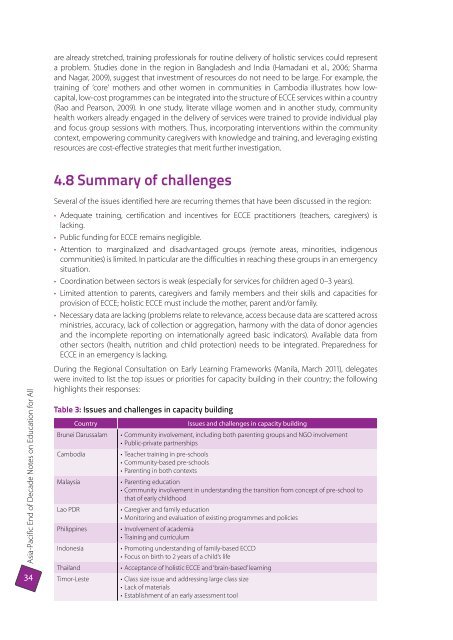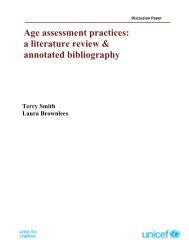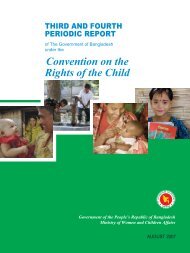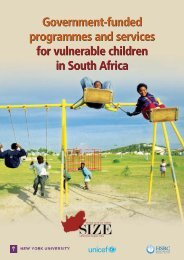EFA Goal 1: Early childhood care and education; Asia ... - Unicef
EFA Goal 1: Early childhood care and education; Asia ... - Unicef
EFA Goal 1: Early childhood care and education; Asia ... - Unicef
You also want an ePaper? Increase the reach of your titles
YUMPU automatically turns print PDFs into web optimized ePapers that Google loves.
are already stretched, training professionals for routine delivery of holistic services could represent<br />
a problem. Studies done in the region in Bangladesh <strong>and</strong> India (Hamadani et al., 2006; Sharma<br />
<strong>and</strong> Nagar, 2009), suggest that investment of resources do not need to be large. For example, the<br />
training of ‘core’ mothers <strong>and</strong> other women in communities in Cambodia illustrates how lowcapital,<br />
low-cost programmes can be integrated into the structure of ECCE services within a country<br />
(Rao <strong>and</strong> Pearson, 2009). In one study, literate village women <strong>and</strong> in another study, community<br />
health workers already engaged in the delivery of services were trained to provide individual play<br />
<strong>and</strong> focus group sessions with mothers. Thus, incorporating interventions within the community<br />
context, empowering community <strong>care</strong>givers with knowledge <strong>and</strong> training, <strong>and</strong> leveraging existing<br />
resources are cost-effective strategies that merit further investigation.<br />
4.8 Summary of challenges<br />
<strong>Asia</strong>-Pacific End of Decade Notes on Education for All<br />
34<br />
Several of the issues identified here are recurring themes that have been discussed in the region:<br />
Adequate training, certification <strong>and</strong> incentives for ECCE practitioners (teachers, <strong>care</strong>givers) is<br />
lacking.<br />
Public funding for ECCE remains negligible.<br />
Attention to marginalized <strong>and</strong> disadvantaged groups (remote areas, minorities, indigenous<br />
communities) is limited. In particular are the difficulties in reaching these groups in an emergency<br />
situation.<br />
Coordination between sectors is weak (especially for services for children aged 0–3 years).<br />
Limited attention to parents, <strong>care</strong>givers <strong>and</strong> family members <strong>and</strong> their skills <strong>and</strong> capacities for<br />
provision of ECCE; holistic ECCE must include the mother, parent <strong>and</strong>/or family.<br />
Necessary data are lacking (problems relate to relevance, access because data are scattered across<br />
ministries, accuracy, lack of collection or aggregation, harmony with the data of donor agencies<br />
<strong>and</strong> the incomplete reporting on internationally agreed basic indicators). Available data from<br />
other sectors (health, nutrition <strong>and</strong> child protection) needs to be integrated. Preparedness for<br />
ECCE in an emergency is lacking.<br />
During the Regional Consultation on <strong>Early</strong> Learning Frameworks (Manila, March 2011), delegates<br />
were invited to list the top issues or priorities for capacity building in their country; the following<br />
highlights their responses:<br />
Table 3: Issues <strong>and</strong> challenges in capacity building<br />
Country<br />
Brunei Darussalam<br />
Cambodia<br />
Malaysia<br />
Lao PDR<br />
Philippines<br />
Indonesia<br />
Thail<strong>and</strong><br />
Timor-Leste<br />
Issues <strong>and</strong> challenges in capacity building<br />
Community involvement, including both parenting groups <strong>and</strong> NGO involvement<br />
Public-private partnerships<br />
Teacher training in pre-schools<br />
Community-based pre-schools<br />
Parenting in both contexts<br />
Parenting <strong>education</strong><br />
Community involvement in underst<strong>and</strong>ing the transition from concept of pre-school to<br />
that of early <strong>childhood</strong><br />
Caregiver <strong>and</strong> family <strong>education</strong><br />
Monitoring <strong>and</strong> evaluation of existing programmes <strong>and</strong> policies<br />
Involvement of academia<br />
Training <strong>and</strong> curriculum<br />
Promoting underst<strong>and</strong>ing of family-based ECCD<br />
Focus on birth to 2 years of a child’s life<br />
Acceptance of holistic ECCE <strong>and</strong> ‘brain-based’ learning<br />
Class size issue <strong>and</strong> addressing large class size<br />
Lack of materials<br />
Establishment of an early assessment tool

















